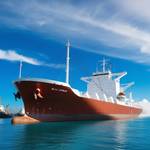Offshore Oil
"Offshore" refers to the discovery and development of oil and gas resources which lie underwater. Usually the term refers to ocean-based oil extraction , though the term can also apply to drilling in lakes and inland seas. The remote locations and harsh conditions of offshore oil production present different challenges than do land-based operations. Platforms and facilities must be carefully designed, assembled, and maintained to ensure safe, productive, and environmentally responsible operations.
Crew supplies , transportation, and waste disposal all rely on support vessels, and must be carefully coordinated to make the most of limited time, space, and resources. The isolation and cramped conditions of offshore facilities can cause personnel difficulties. Rig work is considered higher risk and the staff usually receive higher salary than industry workers in other fields. Technological advances in communications, such as video conferencing, have made it possible to keep more personnel onshore.
Offshore drilling presents environmental challenges, especially in extreme conditions or when operations are located close to land. Platforms are designed to function in many different situations: from shallow-water steel jackets and jackup barges; to floating semi-submersibles and deepwater drillships. There are currently more than 600 mobile offshore drilling rigs in the competitive rig fleet, including jackups, semisubs, drillships, and barges.



















